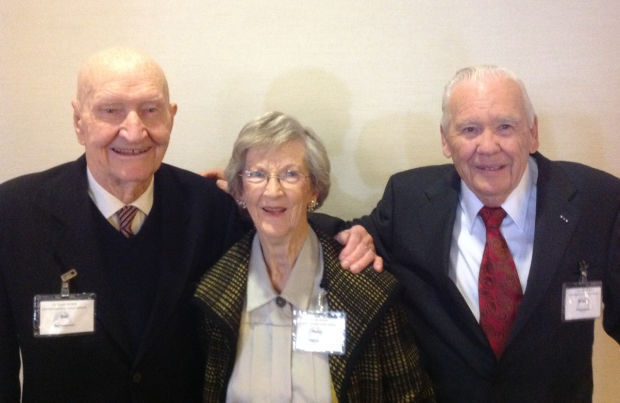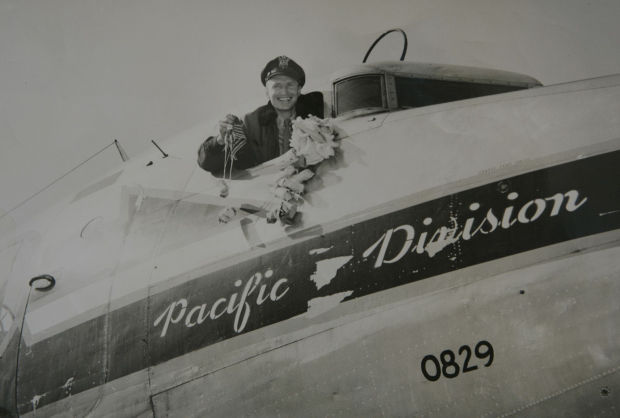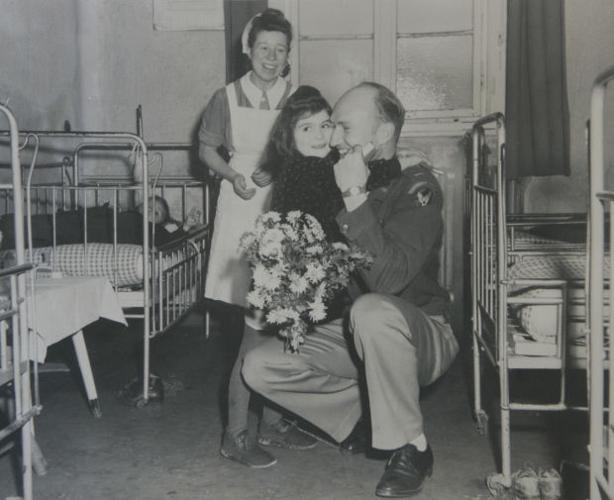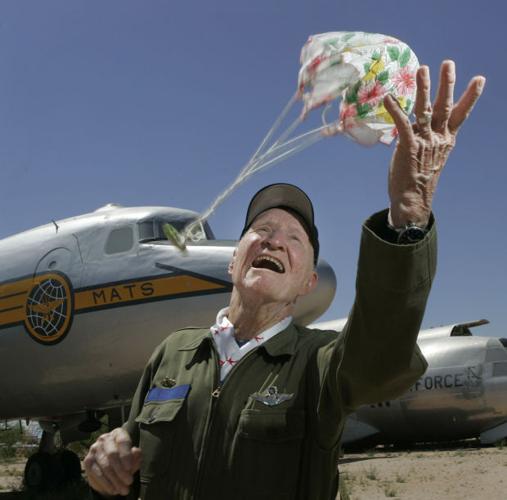Growing up in the years before World War II on a sugar beet farm in Utah, retired Col. Gail Halvorsen watched the airplanes fly overhead.
“I would look up at the sky and see those beautiful airplanes flying from Utah to Idaho, and I said, ‘Boy, that’s what I want to do,’ ” said Halvorsen, 94, speaking by phone from his home in Amado. “Farm work inspired me to want to fly in the blue sky.”
And he did, flying first for the volunteer-based Civil Air Patrol in 1941 and 1942 and then for the United States Army Air Corps, where his sweet addition to the Berlin Airlift would earn him nicknames such as the “Berlin Candy Bomber” and “Uncle Wiggly Wings.”
Halvorsen and two other Southern Arizona residents attended a ceremony Wednesday on Capitol Hill that awarded the Civil Air Patrol with a Congressional Gold Medal for its World War II service.
Halvorsen, along with Tucson residents Helen Gunter, 88, and Richard “Jerry” Snyder, 86, received bronze replicas of the medal — the highest civilian award in the country — later that day.
About 40 World War II CAP members attended, along with their families and the families of deceased members.
Founded on Dec. 1, 1941 — just one week before the attack on Pearl Harbor — CAP drew about 200,000 civilian volunteers to fly anti-submarine patrols, operate search-and-rescue-missions and tow military targets for training, among other responsibilities, said John Swain, the organization’s director of government relations.
President Obama signed the bill to honor CAP’s wartime service on the home front in May, more than 70 years after its service began. Swain said the legislative process began in 2010.
Jerry Gunter, 64, accompanied his mother Helen Gunter from her Tucson home to Washington, D.C., for the ceremony.
“She said everybody made so many sacrifices in the war,” Gunter said of his mother’s decision to join CAP’s Iowa Wing as an 18-year-old.
With brothers in combat overseas, Helen Gunter’s part in the war effort involved working in CAP logistics and communications and manufacturing aircraft parts, Jerry Gunter said. A member of CAP for more than 20 years himself, Gunter knew nothing of his mother’s service until about five years into his own. She never talked about it.
Halvorsen joined CAP’s Utah Wing as a 20-year-old to get his “military wings,” he said, serving there in 1941 and 1942 before joining the Army Air Corps, which later became the Air Force. Snyder also transitioned from CAP to military service.
Although the organization emphasized preparing individuals for the military, it also opened the door to civilians who were too old, too young or physically unfit for military service. CAP led the way in giving female pilots a place in the sky, Swain said. While not all members were pilots, those who were often used their own planes.
Some even sacrificed their lives. During the war years, 65 members were killed, and 150 airplanes were lost, according to Swain.
That is what Halvorsen calls “service before self.” In 1948, two sticks of gum and a crowd of candy-deprived German children would catapult that philosophy into the spotlight.
Serving on active duty during the Berlin Airlift, Halvorsen dropped parachutes with candy to children in West Berlin after meeting a group of them in person.
“They didn’t beg for chocolate all that time we stood there talking,” Halvorsen said. “It would never have happened if one child had said, ‘Give me chocolate, give me chocolate.’ ”
But these children in a city still rebuilding from the war said nothing — unlike others Halvorsen had encountered around the world. He offered the two sticks of gum in his pocket to dozens of children. It was not enough, so he told them to return later to that same spot “between the bombed-out building and barbed-wire fence.”
Halvorsen flew overhead, showering the children with candy. So they would know what plane to expect, Halvorsen wiggled his wings. “Uncle Wiggly Wings,” he was dubbed.
“We had to have permission to drop stuff, and I didn’t have it,” he said. “I got caught. I wasn’t supposed to drop things out of the airplanes without permission, so I did it on my own and hoped nobody would catch me.”
A German newspaper outed him. But instead of getting punished as he expected for dropping unsanctioned goods, approval from higher-ups launched “Operation Little Vittles” for the children in Soviet-blockaded West Berlin. Other pilots joined in, and in the next year, planes dropped more than 20 tons of candy, Halvorsen said.
The children would look for his plane — just as Halvorsen scanned the skies from his family’s beet fields. When he joined CAP and then the Army Air Corps, he became the one in the plane.
Halvorsen retired from the Air Force in 1974 after almost 40 years of service and went on to work as the assistant dean of student life at Brigham Young University. After the death of his wife in 1999, he remarried with his high school sweetheart, Lorraine Pace, who spotted him on a TV interview. The two reconnected in Phoenix.
“She still had her pretty white teeth,” he said.
For a while, he bounced between their Amado home and a Utah farm but now spends most of his time in Arizona.
Next week, Halvorsen plans to once again drop candy from a C-54, the plane he flew during the Berlin Airlift. This time, he will be near the Wright Brothers National Memorial in North Carolina, as he has been in years past, to commemorate the flight of the Wright brothers.
All these years later, he still loves it — taking to the skies and “watching the kids chase the parachutes.”








